
Practicing What We Preach: How I (Actually) Use Coping Skills in Real Life
As therapists, we spend a lot of time helping others navigate distress. We offer tools to manage anxiety, regulate emotions, and stay grounded in the face of uncertainty. But here’s the truth: coping skills aren’t just for our clients — they’re for us, too.
This isn’t a blog about how perfectly I use the tools I teach. It’s about how I return to them again and again, imperfectly and sincerely, in real life. Being a therapist doesn’t make us immune to worry, burnout, grief, or overthinking. If anything, it means we often carry more from our clients, our families, and our inner expectations of how we're “supposed” to handle it all.
When My Thoughts Won’t Stop: Using CBT in the Middle of the Night
Recently, I found myself wide awake at 2:15 AM, spiraling about everything from my inbox to whether I said the wrong thing during a training. I felt my chest tighten and my mind race. I knew I was catastrophizing, but in the moment, it didn’t feel like a distortion — it felt real.
Here’s what helped:
I grabbed a pen and jotted down every “what if” on my mind.
I labeled each one (catastrophizing, mind-reading, all-or-nothing thinking).
Then I challenged one or two gently, asking, “What’s another way I could look at this?”
This isn’t about fixing the spiral completely. It’s about softening it enough to get back to sleep, or at least rest.
When My Nervous System is Fried: Coming Back to the Body
On days when I’ve been on Zoom too long, or I’ve had back-to-back emotional sessions, my body gives me cues neck tension, shallow breathing, and irritability. I used to try to push through. Now, I pause.
Here’s what I actually do:
I get up and orient to the room, noticing five colors or sounds.
I use bilateral stimulation, like tapping one hand against each thigh slowly.
I lie on the floor with my legs up the wall for five minutes, eyes closed.
Somatic regulation isn’t always glamorous. But these small resets help me stay grounded when I feel pulled in a million directions.
When I Feel Like I'm Failing: Practicing Self-Compassion
Sometimes I catch myself thinking, “You should be handling this better. You teach this stuff.” That voice can be so harsh, especially when I’m tired or depleted. When I notice that inner critic taking over, I try to practice what I preach.
What helps most:
Placing a hand over my chest and offering myself the same words I might say to a client:
“This is a hard moment. You're doing your best. You’re allowed to struggle.”Noticing the judgment and gently choosing curiosity instead.
Remembering that being human doesn’t make me a less competent therapist — it makes me a more compassionate one.
A Real-Life Example: Hosting, Overdoing, and the Power of a Pause
A few weeks ago, I was hosting a small gathering. I wanted it to be relaxing, but in reality, I was juggling food, music, conversation, and low-key social pressure to make everyone feel welcome.
About halfway through, I felt myself getting overwhelmed. I was smiling, but my jaw was tight. My thoughts were scattered, and I realized I hadn’t sat down in over an hour.
So I took a breath, stepped outside, and gave myself five minutes to reset. I grounded through my senses, took some slow exhales, and said to myself, “It’s okay to step away. You’re allowed to take care of yourself, too.”
When I went back inside, I felt lighter, clearer, and more present.
The Messy, Meaningful Practice of Returning
Coping skills aren’t a checklist to be perfectly executed. They’re practices we return to — again and again — in all the messiness of real life. They help us pause, recalibrate, and reconnect with ourselves and the people we serve.
So if you’re a therapist, healer, or helper who sometimes forgets to breathe, who struggles to set boundaries, or who doubts your own advice, you’re not alone.
We practice what we preach, not because we’ve mastered it, but because we need it just as much as our clients do.
Want to Go Deeper?
If this post resonated with you, we invite you to explore it further in one of our continuing education experiences. Whether you prefer a live interactive training or the flexibility of a self-paced course, we offer practical tools rooted in real life, not perfection.
Check out: EngagedMindsCE.com
